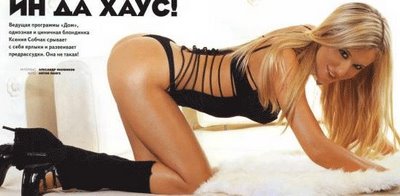Freedom should always be restricted

Ksenia Sobchak (above) is a career celebrity, she is the darling of Russian tabloids, the most eligible bachelorette in Moscow, a city of petrodollar glamour, flush with 36 billionaires. The host of Dom 2, Russia's hit reality TV programme, she plays cupid to the show's contestants, bolstering her sex-kitten image as the media darling of the country's implausibly rich elite.
But now Sobchak is trying to use her image to political advantage: she has formed a youth movement aimed at encouraging young people to assert their rights. She announced the creation of "All Free" last Thursday, an attempt to turn her feisty image into people power.
Why is she starting a youth movement, the sort of group used in Ukraine and Georgia to unseat the authoritarian governments allied to the Putin administration? Lilya Shevtsova, an analyst at the Carnegie Endowment thinktank, suggests the idea may not have been her own. "Anything connected to the Sobchak family should be connected to the Kremlin's initiative, or inside their control, taking into account who her father was," she says, adding that it is probably to do with "political cloning", whereby the Kremlin makes its own versions of traditionally opposition ideas.
What Sobchak's movement, All Free, stands for is not completely clear. Sobchak only announced its creation nine days ago and will not or cannot say how many members she has before her first congress in a fortnight's time. But her rhetoric chimes nicely with the managed democracy of Putin's Russia. She advocates freedom of the press and of association, and respect for minorities, all hot topics in a country where state control and xenophobia are on the rise. Young people should become more aware of their rights, she says, adding they should name and shame university professors who demand bribes for places.
Yet "freedom should always be restricted", she says, adding that otherwise you have anarchy. "If we stay within the law [young people] can decide what's right for themselves." She says she is financing the group and its headquarters in central Moscow from her own pocket, but hopes businessmen will come to her aid. "We try to get young people to stand up for their rights. A fight for your rights can be a party. We want to do it in a free and funky way," she says. - from Saturday's Guardian.
 Now playing - Shostakovich's String Quartet No. 8 in C minor performed by Rubio Quartet (Brilliant Classics 6249); Under Stalin the 1948 "Resolution of Music," headed by Andrey Zhdanov, had listed the official, acceptable musical genres, chamber music was not among these and it had been denounced. The decree had also condemned Shostakovich, together with Prokofiev and Khachaturian, for 'formalist' and decadent tendencies. By the time of the composition of the Eighth Quartet in 1960 the 'thaw' had begun, and Khrushchev's reforms had begun dismantling Stalin's brutal legacy, and Shostakovich had even agreed to join the Communist Party. But, although Zhadanov's decree was no longer strictly enforced, its legacy remained and the Eighth Quartet, with its autobiographical text, was a brave statement opposing the ideology that 'freedom should always be restricted'.
Now playing - Shostakovich's String Quartet No. 8 in C minor performed by Rubio Quartet (Brilliant Classics 6249); Under Stalin the 1948 "Resolution of Music," headed by Andrey Zhdanov, had listed the official, acceptable musical genres, chamber music was not among these and it had been denounced. The decree had also condemned Shostakovich, together with Prokofiev and Khachaturian, for 'formalist' and decadent tendencies. By the time of the composition of the Eighth Quartet in 1960 the 'thaw' had begun, and Khrushchev's reforms had begun dismantling Stalin's brutal legacy, and Shostakovich had even agreed to join the Communist Party. But, although Zhadanov's decree was no longer strictly enforced, its legacy remained and the Eighth Quartet, with its autobiographical text, was a brave statement opposing the ideology that 'freedom should always be restricted'.Image credit - Ksenia Sobchak from Federalpost.ru, Shostakovich illustration by Nathan Jensen who kindly gave his permission for image to be used - check out his web site. Any copyrighted material on these pages is included in "fair use", for the purpose of study, review or critical analysis only, and will be removed at the request of copyright owner(s). Report broken links, missing images and other errors to - overgrownpath at hotmail dot co dot uk
If you enjoyed this post take An Overgrown Path to Good Night, and Good Luck Shostakovich










Comments
You do great work.
The issue of post-Soviet corruption is currently a very big issue in Ukraine, where several generations of "citizens" have had to resort to bribery to obtain education, medical care, apartments, food, transportation, holidays, and much else.
This past January 2006, the streets of Kyiv, Odesa, Sevastopol, and Lviv, Ukraine were plastered with ubiquitous small posters featuring a small envelop with a bar across it, along with explanatory text. Citizens of the new Ukrainian democratic state were being asked not to pay bribes for citizen services which are now to be expected to be fairly provided.
I wonder whether the new movement in Russia for 'rights' and transparency in goverment transactions is also using this new iconic symbol?
*
Thank you for the very interesting and timely post, Pliable.